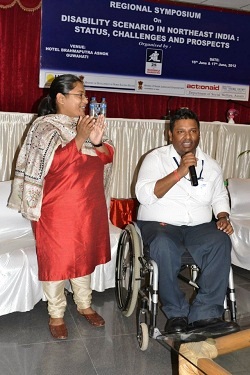His name is Jadav Payeng, aka Mulai. The name didn't ring any bell in my mind. I was commissioned as a cameraman to shoot a short documentary film on him. At first I thought it was yet another one of my dreary shooting assignments. Reluctantly I said yes to my director/producer who was to fly down from Delhi to Jorhat the next day. I traveled to Jorhat from Guwahati with my shooting crew. My primary interest in the shoot was to see some remote places that I hadn't seen before. Little did I know then that I was about to film a man who life is amazingly extraordinary.
The first obstacle was reaching Kokilamukh where Jadav stayed. It was drizzling and the muddy village path was not exactly motorable. We were told that the rickety wooden bridge would not hold up the load of our shooting equipment laden Bolero. We turned around and drove into another muddy non-motorable road. After getting stuck three times in the knee deep mud we finally reached Jadav's house in Kokilamukh only to find out that he had already left for his second house across the Brahmaputra river. We jumped into an about to leave motorized country boat with all our equipments and reached the island called Aruna Chapori (sandbank) where Jadav spends most of his time. We walked through villages and forests for three hours and crossed two rivulets by boats and finally reached Jadav's 'kuthi' (cowshed).
And there he was this diminutive man of around 50 years, whom everyone now calls the Forest Man of India. He stuck me as a man on a mission immediately. "What brings you guys here?" he asked, skipping the extended exchange of Assamese niceties. Without further ado he lit the firewood to make tea for us. My director explained the purpose of our visit to him.
The 'kuthi' that Jadav called home was covered from the top by straw and open from all sides. It was in a clearing next to a dense forest. There was a wooden plank that was his bed. It was raised some 5 feet off the ground. "It helps me to keep a watch on wild elephants," Jadav explained when he saw the whole six feet of me struggling to climb on to his bed to sit. "But these wild elephants were not there before" he explained. In fact there were neither elephants nor any other animal till few years back. It was just a patch of barren sandbanks.
It all began in 1979 when Jadav as a young lad of 16 was walking along the Aruna Chapori near Kokilamukh, Jorhat. He was greatly saddened to see many dead snakes along the sandbank. Lack of tree cover and the heat had caused the snakes to die. He immediately decided he had to do something. And what he did is remarkable. He started planting trees. He planted and planted. And then he planted thousands more. In the past 33 years he has covered an area of 10 sq km and it is still growing. The forest he created is now named after him-Mulai Kathoni.
In the initial years the social forestry department of Golaghat helped him out by launching a tree plantation scheme in the area. After five years the project got over and since then Jadav has been looking after the forest all by himself.
In the beginning Jadav faced great difficulty in convincing the people of Kokilamukh to refrain from cutting trees for firewood. "People would come and cut the trees I had planted," he lamented. Sometimes he even dared them to kill him before they cut tress. Gradually they got around to seeing his point of view. He explained, "If you people keep cutting all the trees one day we will have no oxygen to breathe and we will have to buy oxygen just like people buy water in bottles in big cities". Over the years a few of his friends and well-wishers have joined him in his efforts to create a forest
So how does he get money to do all this I had asked him. He said he had some cows and buffalos and makes money by selling the milk. But the money is barely enough to look after his wife and three children. And sometimes the tigers come and take away his cows. He doesn't mind that. "Like us humans, tigers also have to eat to survive," he reasoned.
Jadav's efforts in forestation have led to two unintended consequences. Man-animal conflict and poaching. As the forest grew in size animals started coming -- elephants, tigers, leopards, rhinos and birds of all hues. Elephants have broken down a few houses in the nearby villages but no one has been hurt till now. Just a few days before our shoot, a full-grown male rhino had been killed by some poachers. Jadav was so inconsolable that he didn't eat for 3 days. It was as if a dear one in the family had died. He has approached the forest department asking them to set up permanent forest camps and guards to protect the forest and animals but nothing has been done till now. In fact besides giving him a few saplings the department has not shown much interest. He now refuses to meet any government official or minister for help.
The only people he loves to meet are conservationists and environmentalists who show keen interest in his work. Besides he meets a lot of children, as he believes that making children aware of the environment means half the battle won.
In July this year former President Kalam honored Jadav during the Sangeetha Sabha diamond jubilee celebrations for his efforts in conservation. After the felicitation Kalam asked him to stay back for 10 minutes after everyone had left. They spent an hour and a half together discussing issues of conservation. Before that JNU had conferred the title of 'Forest Man of India' on him. Jadav has now been invited to a UN convention in Paris to address a gathering of environmentalists from all over the world.
Jadav now has new things to worry about. He has to go to Jorhat to buy Bata shoes to wear in Paris. And a white shirt and pant too. "Why not a tie also?" I added helpfully. "Nah" he shook is head. "Tie is no good. Difficult to breathe" he replied. He now is practicing eating with spoon. But he fears that in the big 7 star hotel in Paris he might not get to eat dal and rice.
Now didn't I say this man is amazingly extraordinary? It is not everyday that you meet someone who makes forests as a hobby.
Find us on facebook: facebook.com/TheThumbPrintMag







































